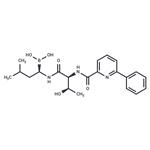Description
Delanzomib is an orally bioavailable inhibitor of chymotrypsin-like proteasome activity (IC
50 = 3.8 nM in isolated human erythrocytes) that only marginally inhibits tryptic and peptidyl glutamyl proteasome activity. Delanzomib pre-treatment (20 nM)
in vitro inhibits IκBα degradation, NF-κB activation, and the expression of NF-κB-regulated genes, including IκBα, XIAP, TNF-α, IL-1β, ICAM-1, and VEGF. Delanzomib induces apoptosis in multiple myeloma cell lines and inhibits proliferation in a panel of human hematologic and solid tumor cell lines (IC
50s = 5.6-34.2 nM). It reduces tumor weight in an RPMI 8226 human multiple myeloma mouse xenograft model when administered intravenously at doses ranging from 1.5-4 mg/kg twice daily and leads to complete tumor regression at a chronic oral dose of 13 mg/kg. Delanzomib reduces the serum level of circulating cytokines, prevents renal tissue damage, and increases lifespan in a mouse model of fatal lupus nephritis.
Uses
Delanzomib is an orally active proteasome inhibitor. Delanzomib has been shown to down-modulate NF-κB, induce apoptosis, inhibit angiogenesis and M-CSF-RANKL-induced osteoclastogenesis.
Definition
ChEBI: Delanzomib is a C-terminal boronic acid peptide inhibitor which induces apoptosis in multiple myeloma, hematological and solid tumor cell lines. It has a role as a proteasome inhibitor, an apoptosis inducer and an antineoplastic agent. It is a threonine derivative, a phenylpyridine, a C-terminal boronic acid peptide and a secondary alcohol. It is functionally related to a L-threonine.



